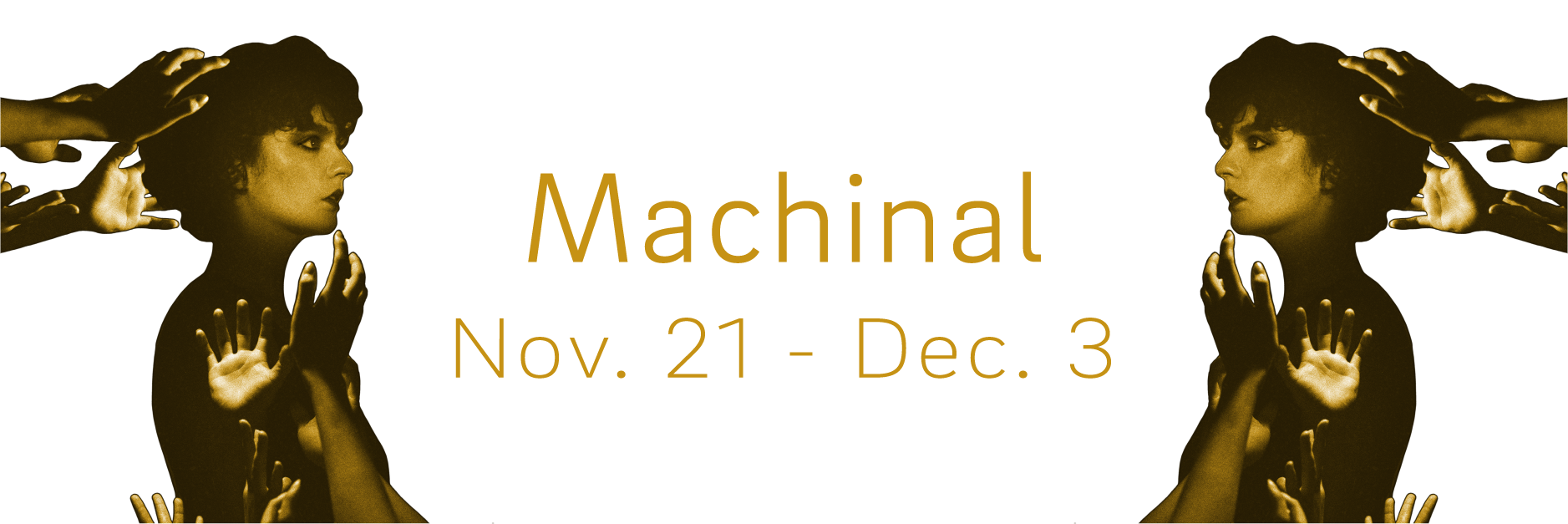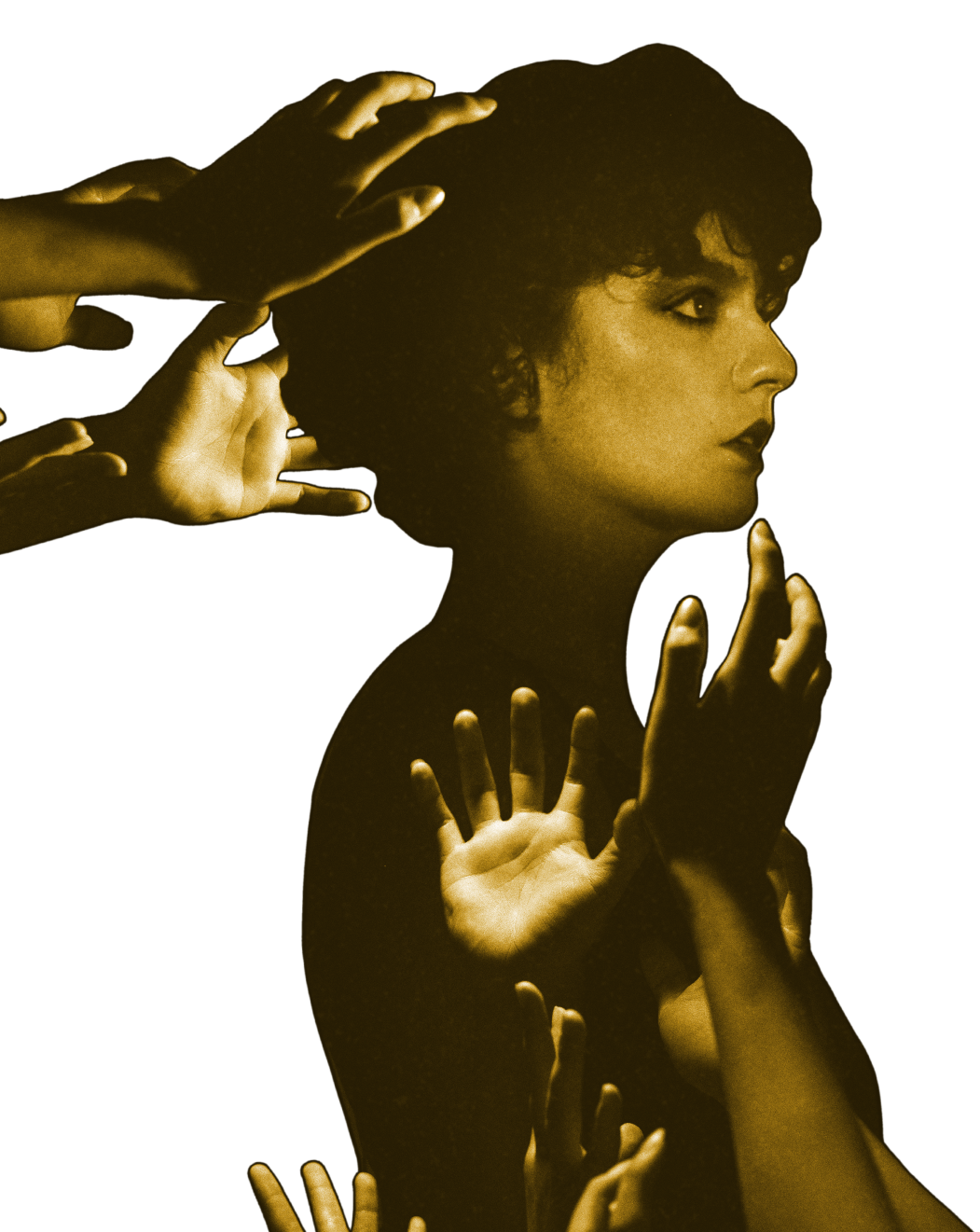Machinal
November 21 - December 3 | Theodore and Adele Shank Theatre
By Sophie Treadwell. Directed by Rosie Glen-Lambert MFA '24.
About the Show
A "Young Woman's" alienation in a patriarchal, mechanical world.
Content Warnings
Machinal and/or this production of Machinal contains references to or explorations of the following topics, which may be triggering:
Sexual Assault, Sexual Harassment, Rape, Abortion, Murder, Violence, The Death Penalty, Hate Speech (Race, Gender), Transphobia
Please be advised this show contains flashing lights/photosensitive effects and sudden loud noises.
Tickets
Purchase tickets using the links below
November 21 @ 7:30pm - SOLD OUT
November 22 @ 7:30PM - SOLD OUT
November 30 @ 7:30pm - Sold out
December 2 @ 7:30pm - Sold out
|
Coming soon: click image to view digital program! |
The Cast
Young Woman: Ellen Nikbahkt*
Husband/Judge: Victor Flores
Lover: Ryan Ritterby
Mother/Court Reporter: Abigail Hood
Filing Clerk/Second Queer Man/Barber: Mark Dyachuk
Telephone Girl/Reporter 2: Rachel Halili
Adding Clerk/First Queer Man/Guard: Tommy Huebner
Stenographer/Bartender/Reporter 1: Gabriella Marie Johnson
Married Man/Lawyer for Prosecution: Sashank Kanchustambam
Doctor/Man with Pregnant Woman/Bailiff/Jailer: Michael Kendrick
Nurse/Pregnant Woman/Reporter 3: Isabelle McKelvey
Lawyer for Defense/Priest: Aidan Zusin
The Creative Team
Director: Rosie Glen-LambertProduction Stage Manager: Caleb Thomas Cook*
Scenic Designer: Michael Wogulis
Lighting Designer: Bryan Ealey
Costume Designer: Euihyun Song
Sound Designer: Salvador Zamora
Projections Designer: Michael Wogulis
Dramaturg: Madison Mae Williams
Assistant Director: Mawce Dunn
Assistant Director: Laylena Zipkin
Assistant Stage Manager: Lily Fitzsimmons
Assistant Stage Manager: Lily Fitzsimmons
Assistant Stage Manager: Huai Huang
Assistant Scenic Designer: Tzu Yu Su
Assistant Scenic Designer: Frank Seed
Assistant Costume Designer: Ting Xiong
Assistant Lighting Designer: Russel Chow
Assistant Lighting Designer: Taylor Olson
Assistant Sound Designer: Elise Wesley
Production Assistant: Angela Park
Production Assistant: Lisette Velandia
Faculty EDI Advocate: Ursula Meyer
*Appears by permission of Actor’s Equity Association, the union of professional
Actors and Stage Managers in the United States
Director's Statement
It is a deeply lonely task to try and fit yourself into a space where you do not feel you belong. In Machinal by Sophie Treadwell, Helen Jones-referred to as “Young Woman” in the script-finds herself constantly alienated by the patriarchal, mechanical world in which she lives. The subways are too crowded, her work is endless and repetitive, and at the age of 23 the pressure to maintain beauty standards, get married, and have children is consuming her. Navigating her way through the rigidity of this society, Helen feels like she is the only one struggling to conform, and she yearns endlessly for somebody to help her feel stabilized. Helen cannot manage to connect with anyone else for whom the pace and inflexibility of the world is similarly crushing, although the play strongly implies that others face a similar struggle. A scene that takes place in a speakeasy demonstrates that this is a world built to exclude, and it is stifling to anyone who is not a cis, straight, white, wealthy man. As a woman in this environment, there is an unrelenting and narrow forward motion to the Young Woman’s life, and the anxiety it breeds makes her desperate for an escape. It isn’t until she meets a drifting man who lives outside of this society that she sees a pathway for this escape: he mentions a time in his travels where he had to kill a group of men holding him captive in order to be free, and instantly she is intoxicated by and thirsty for the freedom he has. As a woman, she isn’t afforded the same opportunities he is to drift and live safely outside of conventional society, but she hears in the extreme of murder a leap she could potentially take. She has an affair with him, but more importantly she gets close enough to plot her own escape. Young Woman murders her husband in an effort to free herself from her narrow trajectory. Soon after, she is put on trial for his murder, found guilty, and put to death. Her last words before she is executed are “Somebody! Somebod-”
First performed on Broadway in 1928, Machinal may read initially as a period piece. References to speakeasies, “expensive” twelve dollar a night hotels, and radio certainly ground the play squarely in the circumstances of the late 1920’s. It is tempting to treat this play like a period piece, celebrating the peculiarities and sensibilities of the 1920s. But this interpretation does a disservice to the text, which was decidedly modern in its time. Revivals of Machinal must not fetishize the text or allow it to be something the audience can feel distant from. Sophie Treadwell wrote Machinal in response to the true story of Ruth Snyder, the first woman to be executed by the state of New York for murdering her husband. Ruth Snyder’s trial was highly sensationalized, and lead an entire nation to try to answer why a woman might murder her husband. Sophie Treadwell felt compelled to answer this question by writing an expressionist account of the stifling, misogynistic society women of her time were forced to contend with. Ruth Snyder’s trial was in 1927, and by 1928 Machinal was already being performed on Broadway. Sophie Treadwell did not set out to write a period piece about the 1920’s-she wrote an intensely urgent piece of theatre in response to the realities of her own modern times.
It is this spirit of urgency that is a driving force for me in staging my production of Machinal nearly a century later. A 2022 audience which is continuing to critically investigate the way our society has not been built with women, queer folks, POC, disabled people, Non-Christian people, etc in mind is uniquely qualified to empathize with Young Woman’s plight. Today, we are only beginning to discuss the complexity of gender in mainstream spaces. Words like “Cisgender”, “Nonbinary”, and “Trasgender” are becoming part of the zeitgeist, but widespread understanding of gender as something an individual asserts for themself rather than something a person is born with remains contentious. The majority of our systems and spaces continue to enforce a narrow approach to gender expression. One close-to-home example of this is that there remain only two gendered bathroom options on the majority of UCSD’s campus, including the ones on the two main levels of our own Theatre and Dance Building. This rigidity may go unnoticed by those it does not actively affect, but for the person who is neither a Man nor a Woman, having to select which restroom to use is a daily reminder that this space was not built for them.
It is well-established in the text that the qualities, behaviors, and milestones expected of a young woman in this society are crushing to Helen, and ultimately lead her to believe that murdering her husband is her only escape. But what if, more than feeling limited by the narrowness of being a woman, Young Woman is questioning whether or not she is a woman at all? It is no easy thing to try to explore the possibilities of your gender in a world where you lack the vocabulary to experiment with a term like “nonbinary” and the community you find when you’re able to google phrases like “does anyone else” or “is it normal if”. My production of Machinal will mine the text’s focus on Helen’s discomfort within the expectations of womanhood to explore the challenge of questioning one’s gender in an intensely binary world.
Reading Machinal, I fixate on an image of Young Woman racing endlessly on a treadmill. There are many reasons I find this to be helpful imagery. For one thing, treadmills are a mechanical simulation of running-something that we are naturally able to do independently of machines. Before treadmills were rebranded in the 1920’s as exercise equipment, they were invented in the 1800’s as a torture device for British prisoners. Modern treadmills are an important tool of a fitness culture which polices and controls women’s bodies. And probably most pertinently, treadmills are the epitome of stasis. Much like its cousin the hamster wheel, a treadmill doesn’t allow you escape from your circumstances. But as anyone who uses a treadmill habitually can attest to, it is often a place of deep contemplation, consideration, and decision making. I imagine the space in which Helen is running on the treadmill to be one where she is allowed to make her internal thoughts external, weigh possibilities, and feel shockingly contemporary in her vulnerability. Already as it is written, a 2022 reader will find themself feeling as if Helen lifts off the page. We feel she isn’t bad or wrong for feeling the way she does, and feel desperately pulled to reach through the text and tell her so. Through the simple gesture of a contemporary treadmill, I will create an intimate space in which the audience is allowed to see this character literally lifted out of her circumstances as she questions her ability to slow the trajectory of her life’s path.
Rather than either romanticizing the 1920’s or transposing the play onto modern circumstances, my production will guide its 2022 audience to draw parallels between Young Woman’s circumstances and their own lived experiences. While the nine episodes of the play will be staged in spaces that are filled with objects and people that feel authentic to the 1920’s, it will be the moments between these episodes, the moments where Helen considers whether or not to continue to do what she is expected to do, that are staged in the treadmill space. I am eager to invite the audience to meditate on how it is in our country's DNA to subjugate and pressure, and, regardless of the strides we have made in the past 100 years, how dangerously close we always are to the grim world Treadwell has imagined in Machinal. I want my audience to continue to fight for Helen to live even though they know she will perish, as a reminder to continue to fight for themselves–and for one another.
About the Playwright
Sophie Treadwell, born in 1885 in Stockton, California, was a prominent playwright who worked mostly in the first half of the 20th century in the United States of America. Her most well-known work is Machinal, an expressionist play about women’s freedom in the 1920s. Early on in her childhood, Treadwell’s father deserted her and her mother, and they moved to San Francisco, where Sophie first learned of the theatre. She grew up around many strong female role models, including her single mother and her maternal grandmother. Sophie Treadwell was of Mexican and Spanish ancestry on her father’s side. During her college studies and after graduating from the University of California at Berkeley, Sophie Treadwell tried her hand at many trades, including journalism, secretary work, teaching English as a second language, and even working as a vaudeville singer. Financial instability followed her into adulthood, as did the beginnings of mental illness that would continue to plague her through her life. After following her husband, another journalist, to New York City, Sophie’s modernist political beliefs and values found their home, and through her writing work she supported women’s suffrage, birth control rights, and increased sexual freedom for women. Married to her husband mostly out of a friendly arrangement, the two maintained separate residences and Sophie was free to engage in outside relationships, a standard almost unheard of for that time. Feminism in its earliest roots was the driving force behind how Treadwell chose to live her life and produce journalistic and dramatic work. One of her most famous causes was that of artists’ rights. She advocated both in court and in government for writers to receive fair compensation for their works. Sophie also pushed the boundaries by pursuing commercial audience for her shows on Broadway, and producing a few of the productions herself. Treadwell also loved to travel with her husband. All told, Sophie Treadwell wrote at least 39 plays, several novels and short stories, and innumerable pieces of journalism. Many of her works are hard to come by, but all her writings reflect the same commitment to political investigation and human rights.
Source: https://stageagent.com/writers/6017/sophie-treadwell
About the Director

Rosie Glen-Lambert (she/her) is a second-year MFA student and theatre director originally from Los Angeles. She is the Artistic Director and Founder of the award-winning, Los Angeles-based theatre company The Attic Collective. Prior to beginning her graduate education, Rosie served as the Literary Manager of Inkwell Theater, a Los Angeles-based company that specializes in the development of new work. She remains an Associate Producer with Inkwell, producing a monthly cold-reading series called “Virtual Playwright’s Night” which has connected playwrights, actors, and theatre lovers across the world and provided a platform for diverse writers to have their work heard. Rosie is known for her inventive storytelling, her “more is more” approach to props, and her commitment to the collaborative process.
Everyone sees movies. Everyone goes to concerts. So why is it that theatre is the art form that has been rejected by so many as stodgy, unwelcoming, and “not for” them? Rosie wants to make up for that bad production of Two Gentlemen of Verona you were forced to watch in middle school. She believes theatre should be relevant and inclusive, which has led her to a deep appreciation for new work, devised performances, and purposeful productions and reimaginings of classic works. She is committed to building a world where everyone sees the theatre as being a place where they belong by creating performances that are engaging, inclusive, and relevant.
Rosie received her BA in Theatre Arts from UC Santa Cruz in 2014. Shortly before leaving Santa Cruz to move back to her hometown of Los Angeles, she formed The Attic Collective, a theatre company devoted to new work and devised performances. In 2015, her theatre company’s production of Dead Dog’s Bone won the Encore Producer’s Award at the Hollywood Fringe Festival, with Rosie nominated for Best Direction. The Last Croissant, her second Hollywood Fringe Festival production with The Attic Collective in 2019, was nominated for numerous awards and won Best of the Broadwater, Best Ensemble Production, and the coveted Top of the Fringe Award.
Rosie has worked as a director, assistant director, dramaturg, producer, and theatre educator at theatre companies across and beyond Los Angeles, including Bootleg Theater, Portland Center Stage, Sacred Fools Theater Company, and Son of Semele Ensemble. A proud Jewish Director, she was named a 2020 Theatremacher by the Alliance for Jewish Theatre.

